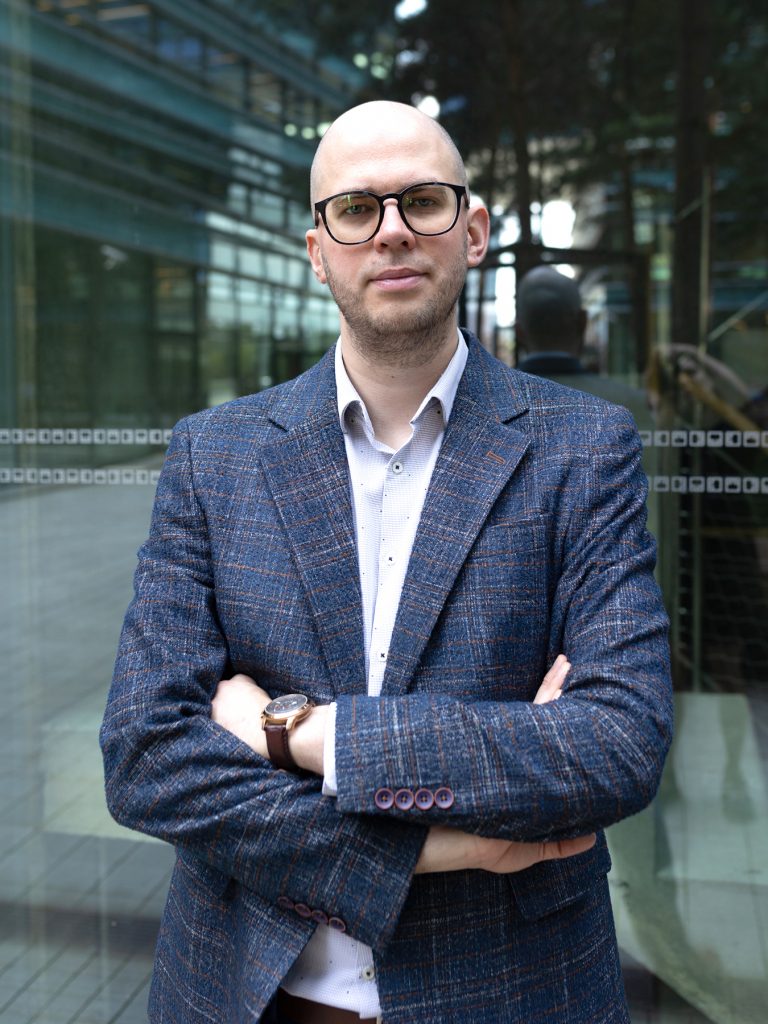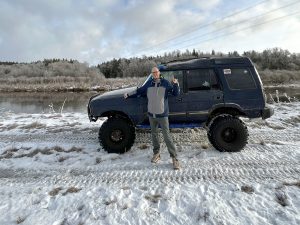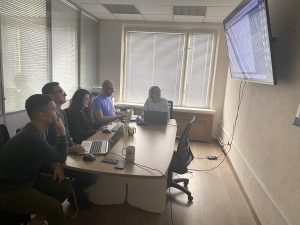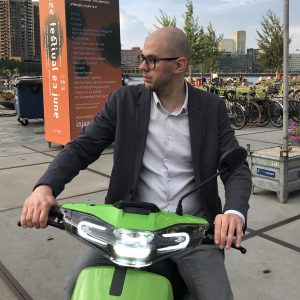- Who We Are
- Updates & News
- Standards
- Software Tools
- Network Studies
- Community Forums
- Education
- New To OHDSI?
- Community Calls
- Past Events
- Workgroups
- Tutorials
- 2025 ‘Our Journey’ Annual Report
- Current Events
- Support & Sponsorship
- 2025 Global Symposium
- 2025 APAC Symposium
- 2026 Global Symposium
- Github
- YouTube
- X/Twitter
- Newsletters
Collaborator Spotlight: Alexander Davydov
Previous Collaborator Spotlights
Alexander Davydov has worked as the Technical Team Lead for the Medical Vocabulary team in Odysseus Data Services for more than five years. Alex and his team play an essential role in supporting the OMOP Standardized Vocabulary development for OHDSI, as well as the vocabulary needs in the OMOP CDM ETL-project-related mapping activities. He helped develop the recently completed OHDSI Vocabularies Landscape Assessment and plan the future roadmap for releases and community contributions.
Before joining OHDSI in 2018, he worked as a clinical microbiologist and a lecturer in academia. He is a fully registered physician and obtained his Medical Doctor degree as well as his Doctor of Philosophy training from Belarusian State Medical University, Minsk, Belarus. Alex has collected extensive experience in the OMOP CDM conventions, particularly around the proper use of the vocabularies. Alex contributed to the CDM/Vocabulary, Vaccine vocabulary, Registry (formerly UK Biobank), ATC, and Oncology working groups.
In the latest collaborator spotlight, Alex shares how his versatile background has benefitted him in all areas of OHDSI, when and why he developed his passion for the community, and his vision for OHDSI’s standardized vocabularies.

Can you discuss your journey to observational health data science, and what you currently do within OHDSI?
The story of how I learned about the OHDSI community started with a completely random chain of events. The chief of the IT department in my alma mater somehow remembered me from five years before when I had been a member of a student scientific society, and referred me to people looking to start an OHDSI initiative in Belarus. Already being interested in biomedical informatics and having used technical methods and tools in my PhD, as well as being skilled in programming after finishing a professional computer science course, I was instantly hooked.
For a considerable period of time, OHDSI was just an enjoyable hobby that aligned with my already solid interest in health tech. It inspired me, and made me feel a part of something bigger. However, one day it all changed 180 degrees. You might have guessed that I’m talking about the beginning of 2020 OHDSI COVID Study-a-thon; after that event, none of us has remained the same. After working 20 hours a day, sometimes getting up at 6 AM and going to bed at 7 AM next day, and constantly living with the feeling that if we don’t complete this, no one will, I finally realized that I do belong here and that I believe in the values and ideas of the OHDSI community. Also, for me it was never about models and revolutionary research methods. And even though I personally never had to do all the steps of the process hands-on and I can’t really speak for each of the pieces, I do know these people, the people of OHDSI who daily move the community forward. I know how they love to work together. I’ve seen the results of this work, which are impressive. So, I believe in OHDSI because I believe in the people, their commitment and devotion, and their effective collaboration that is gradually changing the world for the better.
By your training and previous experience, you are a registered physician microbiologist, a laboratory researcher, and an academia faculty member. How do all those backgrounds provide additional insight or expertise in what you do with OHDSI?
In my career, I did make a few pivots and worked in positions that required completely different professional skills and responsibilities. Now, connecting the dots, I can see how useful and predetermining each of these experiences was and how these backgrounds added up and contributed, directly and indirectly, in what I now do as the lead of the vocabulary team.
Starting from the general medical background that I possess as a preventive medicine doctor with a specialization in clinical microbiology that proves valuable while working on developing the vaccine vocabularies in the vaccine working group and untangling the COVID lab test terminology wool ball, as well as running the team consisting predominantly of practicing doctors; and ending with my experience as an instructor and lecturer in academia, which has helped a lot while building the team, organizing its work, and developing practices for the training of junior specialists.
However, what has influenced my daily work in OHDSI the most, is my 5-year experience as a laboratory researcher, which consisted both of daily routine – performing the experiments, purchasing the equipment and reagents (which so far has been one of the trickiest cost-benefit analysis task I have ever faced :-)), organizing collaboration with other team members, analyzing the study results and writing the papers, as well as continuously mastering the skills in bacteriological, immunological, molecular, bioinformatic methods by having multiple professional trainings – that all taught me how much the consistent work pays off; and milestones such as establishing the national reference laboratory for invasive bacterial diseases under supervision of Prof. Leonid Titov, that required lots of organizational work including the communication with related laboratories and the Ministry of health; managing the national antimicrobial resistance database; bringing the laboratory information systems into practice at national and local levels; and submitting national data to the international networks; developing the local SOPs, national guidelines, or implementing international standards in the workflow at the national level; attending the international external quality assessment programs; and organizing the national training seminars. The skills that this period of life brought might sound very sparse on paper, but for me, this was an experience that formed me as a professional, taught me to take on responsibility and make weighted and well-thought decisions.
You have done extensive work around OHDSI vocabularies, which has been a main focus of the community this year. Can you explain the critical importance of vocabularies for research, and the work involved in maintaining them?
The main reason OMOP vocabularies have always been in the spotlight is that they actually are the central component and the main advantage of the OMOP CDM compared to most other data models. There are several levels at which data standardization is performed, and OHDSI standardized vocabularies is the tool that enables standardization at the “content” level. With the medical terms coded in vocabularies and being the pillar of the study protocol, their content standardization allows us not to rebuild the study protocol each time we deal with different data sources. Instead, we map content from various sources onto standard terms and build the cohorts based on the standard terms. All that allows for a quick and efficient transformation of disparate data sources into a common representation to conduct observational network studies at a fast pace, which is both the critical importance and the crucial advantage of using OHDSI vocabularies for research. Speaking about the actual work on the vocabularies and its system, for me this is first of all about the heroic effort of people, including Christian, Dima, Anya, Polina and others. 140+ unique vocabularies and 64 million relationships is pretty much a piece of cake to deal with. They set the bar originally, and the bar was really high. Taking this work over was a real challenge that we faced during the hard times. With the recent changes in the vocabulary system we targeted a more straightforward maintenance process with more predicted, controlled releases and scope.
What did you learn from the recent Vocabulary Landscape Assessment process, and where do you hope the vocabulary team can build from this information?
We’re really happy and pretty confident about the results of the landscape assessment because it turned out to be the most attended survey the OHDSI community ever had. The most important finding is that there’s a big interest in this topic in the community and a huge need that inevitably leads to a serious scope of work. Vocabularies with the most demand were prioritized and claimed to be on maintenance by the vocabulary team.
What is also important is that people are willing to collaborate in such a way that they would be most willing to support the vocabularies they’re interested in on their own. Here, our task would be to ensure that we provide all the measures needed in this respect such as infrastructure, content exchange dataflow, documentation on both technical and logical components, established communication channels and further support.
How do you see the future of the OHDSI vocabularies once all the changes are implemented as planned?
In the coming years, I see the vocabulary work becoming more open and community-driven, with several zones of responsibilities taken on by the respective groups of people that would work independently but at the same time collaboratively. The total number of folks that work daily on developing the vocabularies would increase from 10-15 to dozens or even a hundred. The number of vocabularies and the amount of the content will increase, but the quality of the “core” will be preserved and even improved.
Speaking of the work on the content, I see a huge potential for using the large language models (such as GPTs, PaLM/Med-PaLM-2) that we’re actively exploring at the moment for building the mappings and hierarchies. This will require a serious transformation the team must be ready to take on.
Can you talk about the upcoming European Symposium, and how the vocabulary topics will be addressed there?
Global and regional Symposia have always been a place where the community demonstrates at the full scale what has been done and what is to be done. At the coming European symposium, a lot of focus will be put on the vocabulary topics that a number of events will address. For example, the workshop dedicated to the community contribution process with the focus on drug vocabularies will help those interested to push their vocabulary content to the OHDSI vocabularies as well as modify the existing content. In addition to that, the vocabulary team will present 3 posters dedicated to the OHDSI Standardized Vocabularies, specifically: Quality management system, Roadmap and improvements and the Community Contribution process.
Looking forward to get together soon in Rotterdam!
 What are some of your hobbies, and what is one interesting thing that most community members might not know about you?
What are some of your hobbies, and what is one interesting thing that most community members might not know about you?
My all-time favorite hobby is snow skiing. Every now and then I love going somewhere in Europe or Georgia and hitting the slope. I also enjoy everything connected to speed vehicles, and my current favorite “side project” has been enhancing the performance of my SUV and upgrading its acceleration skills. This winter I have also gotten into off-road driving – a completely amazing experience for me. In the tour that I did, I had to drive a customized Land Rover over the forests and frozen lakes of Latvia. I also plan to one day experience the feeling of piloting an airplane and get the license of a pilot.


